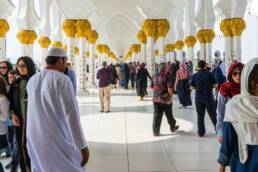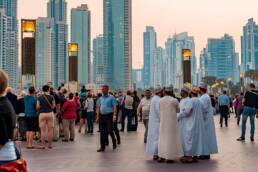CUSTOMS AND RELIGIONS
Abu Dhabi est un fascinant mélange de modernité et de traditions profondément enracinées. En tant que capitale des Émirats arabes unis, la ville reflète la richesse culturelle et religieuse de la région, où l’islam joue un rôle central dans la vie quotidienne. Comprendre les coutumes locales et les pratiques religieuses est essentiel pour apprécier pleinement votre visite et vous immerger dans l’hospitalité légendaire des Émiratis. Préparez-vous à découvrir une culture unique, où respect, spiritualité et patrimoine se côtoient harmonieusemen

1. Customs in Abu Dhabi
Local customs
- Attire: Abu Dhabi, while modern and cosmopolitan, values modesty in dress, particularly in public places like malls, restaurants, and cultural sites. Visitors are encouraged to cover their shoulders and knees out of respect for local customs. Women may be required to cover their hair when visiting religious sites, such as the Sheikh Zayed Grand Mosque.
- Greetings: Warm and respectful greetings are a hallmark of Emirati culture. A handshake is common, but physical contact between men and women who are not relatives is generally avoided. It is polite to wait for a local to initiate a greeting.
- Public behavior: Displays of affection, such as kissing or hugging, are discouraged in public spaces. Maintaining quiet, orderly behavior in public areas is appreciated, as is respect for private space and adherence to queues.
Tips for travelers
- Holy days: Fridays are sacred in Abu Dhabi, marking the day of rest and prayer. Many establishments open later in the day, so plan your activities accordingly.
- Respect for religion: Islam is deeply ingrained in the daily life and culture of Abu Dhabi. Avoid negative remarks about the religion or its practices. Demonstrating open-mindedness and respect will go a long way in fostering positive interactions.
- Festive celebrations: Islamic holidays like Eid al-Fitr and Eid al-Adha are celebrated with great enthusiasm and offer a unique cultural experience. Observing or participating in these festivities can provide deeper insights into Emirati traditions and hospitality.

2. Religion in Abu Dhabi
Islam is deeply woven into the fabric of daily life, laws, and social practices in Abu Dhabi. Visitors will hear the call to prayer (adhan) five times a day, which resonates from the numerous mosques across the city, including the iconic Sheikh Zayed Grand Mosque. Ramadan, the holy month of fasting, brings noticeable changes to daily routines, with adjusted shop and public service hours, and special meals served after sunset (iftar). During this sacred period, non-Muslims are encouraged to be mindful of local customs by refraining from eating, drinking, or smoking in public during daylight hours.
Ramadan:
Ramadan, based on the Islamic lunar calendar, is a time of reflection, prayer, and fasting. Visitors to Abu Dhabi during this month are asked to respect the fasting community by avoiding eating, drinking, or smoking in public spaces between sunrise and sunset. Hotels and resorts continue to serve food and beverages to their guests, often in designated areas that are discreetly screened off from public view. After sunset, the city comes alive with vibrant iftar meals and Ramadan markets, offering a unique opportunity to experience the rich cultural and spiritual atmosphere of Abu Dhabi during this special time.
3. Good to know
1. Visiting during Ramadan
If you plan to visit Abu Dhabi during Ramadan, be aware that many restaurants and cafés will be closed during the day, and the city’s atmosphere will be more serene until sunset. As this is a period of fasting for Muslims, it is respectful to avoid eating, drinking, or smoking in public during daylight hours. After sunset, the city comes alive with vibrant iftar meals and gatherings.
2. Extreme climate
Abu Dhabi experiences intense heat, particularly from May to September, when temperatures often exceed 40°C. It’s essential to stay hydrated, wear sunscreen, and plan outdoor activities for early morning or late afternoon to avoid the peak heat. Light, breathable clothing is highly recommended.
3. Transport
Abu Dhabi offers reliable transportation options, including taxis and buses, but renting a car is a convenient choice for exploring the city and its surrounding attractions, such as Al Ain or the Liwa Oasis. Driving is on the right side, and traffic rules are strictly enforced. Be mindful of speed limits and parking regulations.
4. Accommodation and reservations
From opulent five-star resorts to budget-friendly hotels, Abu Dhabi caters to all preferences. Booking your accommodation in advance is advisable, particularly during peak tourist seasons or major events like the Abu Dhabi Grand Prix or cultural festivals.
5. Use of the Internet and social media
Exercise caution when using social media or taking photographs. It is illegal to photograph people without their consent or to share content that may be considered disrespectful or sensitive. Certain websites may also be restricted, so plan accordingly if you rely on specific online services.
6. Currency and payments
The local currency is the UAE dirham (AED). While credit and debit cards are widely accepted in most establishments, carrying cash is useful for smaller transactions, especially in traditional markets and local souks.
7. Negotiation and purchasing
Haggling is common in Abu Dhabi’s souks and traditional markets, such as those selling spices, textiles, or gold. However, prices in modern shopping malls and fixed-price stores are non-negotiable. Exploring local markets provides an authentic shopping experience and the opportunity to bring home unique souvenirs.
